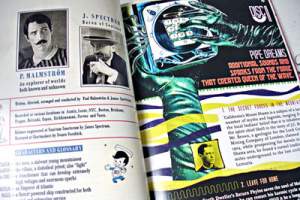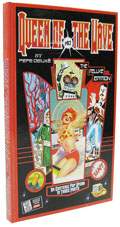
Did the fact that the iTunes generation have lost the habit of buying and playing whole albums influence your decision to release a concept album? Yeah it most certainly did. In 2008, when we started working on the record, there was a lot of discussion about people just downloading single tunes, the death of albums etc. To me albums are the greatest form of art, so naturally I wanted to go against the grain. I felt that the best way to do that was to make a proper concept album, where all the songs would be somehow linked together. Paul [Malmström] thought the idea was crazy, and loved it. Actually, when it comes to Pepe, I don’t think he’s ever liked any of the sane ideas.
Why a sci-fi theme, particularly in a neo-retro style, for the album? There's something very Mystery Science Theatre 3000 about the look of the visuals of the album. There’s a small but important difference between us and things like Mystery Science Theatre 3000: we don’t make fun of obscure pop culture artefacts, incredibly strange music and films. We are having fun with the material, we are inspired by it but we also deeply respect it. I think it’s quite fitting that last show ever for Mystery Science Theatre 3000 featured Danger: Diabolik. After all, it was chosen as one of the five best films ever by a leading Finnish film critic and Paul calls it “The Bible of everything that’s cool”. Now look who’s having the last laugh, hehee!
Why a story about Atlantis? Do you feel we are about to experience an Atlantean level apocalypse? The album is based on a legendary book A Dweller on Two Planets, written automatically in the late 19th century California by a young boy named Frederick S. Oliver. It deals with life and adventures in, not just Atlantis, but also on Venus and in “virtual reality” heavens, races with atomic-powered Vailixi airships, battles against evil high priest and demons etc. etc. What’s even better is that in the preface Oliver presents the book as a true account of the real author's past, that author being a spirit calling himself Phylos the Tibetan.
And you are right there about the apocalypse: among other things the album also carries a warning about a phenomenon called “Venus syndrome” – an uncontrollable runaway greenhouse effect.
Do you have a favourite sci-fi film or book? I’m more of a book person, but choosing a single favourite one is like choosing a favourite album: simply impossible. I’m a big fan of sci-fi and also of the older 19th century scientific fiction. When I was a kid I went through the works of all the classic writers from Verne to Lem, every single one I could find in our big local library. I just finished reading The Quantum Thief by a Finnish writer Hannu Rajaniemi. It was pretty good, although I felt the end was a bit rushed.
William Gibson (Neuromancer) said that he stopped writing science fiction because the future overtook him. Do you ever find yourself in a similar dilemma?
We don’t really try to predict the future. Actually our way is quite similar to the way Edison used to operate: many of his patents are based on work that someone else started but never really finished. He took these all these ideas and tweaked them a little, turning not-quite-theres into practical inventions and products. Me and Paul do a lot of research, a lot of cultural archaeology to find material that people haven’t really seen or heard of, and then develop that material further. My latest love is Victorian and Edwardian electronics - that’s a real goldmine.
Speaking of Edison, you mention Tesla a lot in the book that comes with the Deluxe edition. Are you surprised how little-known he is considering how much he has given the world, and how much better the world would be if he had been allowed to fulfil his vision? For example, free sustainable energy, electric cars and wireless internet were things he invented nearly 100 years ago and cruder versions are only available now. Alexander Graham Bell didn’t invent the Telephone, yet he was credited with that for over 100 years. Also, as I mentioned earlier, many of Edison’s inventions were actually based on work done by other people. It is often not the pioneers, but the people who can turn ideas into products and market them to the right customers, who get all the credit. Nokia phones had touch screens years before iPhones, but those were considered mainly as gimmicks – the user interface just wasn’t there yet.
Are you familiar with Cory McAbee's sci-fi musical film American Astronaut? Have you thought of expanding into creating your own musical feature film? That American Astronaut sounds like a great idea and I loved the fill stills, very nice! But I think we are currently more interested in creating worlds you see with your ears; works where the music itself is the main visual thing and the artwork and images support it. Whereas the music in films is like a good drummer in a band: its main purpose is to make everything else feel and look better.

"How should I sing this?"
"Like a 16 year old girl who's been dating a 40 year old man, but it's all over now."
She looks good, dresses good, lives good, eats, drinks, loves, breathes, dances, sings, cries good. Five foot three and tiger eyes. A mouth made for lollipops or kisses, Stingers or melting smiles.
I think it’s quite sad that in 50 years of “progress” we have lost the best sounds, the artwork and also writers like that: writers who made the music exciting even before you heard a single note of it. Me and Paul can't turn back the tide, but at least we can show example and give our fans proper albums.
There is a lot of really bad electronic music out there at the moment. Just like desktop publishing resulted in a lot of really bad graphic design, have computers made people without any real musical talent think they can make music by linking lots of loops together? Well as you know the short answer is “Yes”, hehee! Yet the average quality, I mean average technical quality, that has jumped up a great deal. I recently had a really good conversation about the subject with Mr. Aku Raski of Huoratron. With all these wonderful toys available, it is so easy and fast to make very decent sounding music. Nobody makes demos anymore; YouTube is full of tutorials of how to sound like your favourite producer and how to master your music yourself. Yet the fact remains that creativity often stems from limitations: Sir George Martin has said that had the Beatles had more than four tracks when making Sgt. Pepper, it wouldn’t be as good an album as it is now.
Just as punk was a reaction to the musical sophistication of prog rock, can you see a return to proper musicianship as a reaction to all the DJs/electronic music of today? Or is there enough room for all styles of music to co-exist? To me perhaps the only thing that is more boring than dance music is mainstream rock music. Every year there are close to 100,000 albums released in the USA alone. Pop and rock are generally geared towards the masses, and as a result of these two facts we have millions of records with tens of millions of songs that are often more or less carbon copies of each other. A recently conducted scientific study has noted that for the last 50 years the amount of ideas in pop music has constantly decreased whereas the loudness has constantly increased. In order to get some interesting new music I think the various styles need to, not just co-exist, but to make babies who listen to orchestral and classical music in order to understand the power of dynamics.
How much of the new album was recorded analogue? I record pretty much everything on a modified C-cassette 4-track recorder. It’s essential for the Pepe sound. The Stalacpipe Organ was recorded with Paul’s Nagra. I also run many sounds through various custom-made processors and a Revox G-36 valve reel-to-reel to get more grit on them. I’m a big fan of the '60s Bollywood and South American records, the aural palettes on those albums are often totally unique: very dirty yet somehow pleasant. Analogue is great for recording and creating sounds, but then again you can’t beat digital tools for editing.
Your live music is a lot rawer than the album, even though it would be easy enough to emulate the studio sound. Is there a reason for keeping the sound pared down when gigging? Well naturally we can’t tour with all the 63 musicians on the album and all those special instruments. Also, as maybe one out of twenty venues is decent when it comes to acoustics, it makes sense to play songs and arrangements that work well live. Because, in addition to the band, we also have visuals that are mixed live, too many little details in music would be distracting. It’s a matter of trying to find the best possible balance between the sound and sights. Live is also great for things like drums solos and battles between musicians: those rarely work that well on albums.
The band has been going for a long time. How come it took so long to do a live gig in London? Will you be doing more UK dates soon? Pepe was originally two DJs and one producer, and we really haven’t had the live band since the previous album Spare Time Machine. We gig very rarely mainly because, in addition to doing Pepe music and art, I’m always researching pop culture, hunting for more material, developing various electronics projects, mixing and producing other bands etc. etc. There are simply too many fun things to do. But I also like the fact that the gigs are few and far between: that means there’s really no routine and I’m always super nervous and excited before the performances. I think the audience can feel that energy too: they are witnessing something quite unique every time we play.
Before coming to the gig I wasn't familiar with your music and looking at the website I was expecting the music to be all like the song Go Supersonic, but there are lots of different styles on the album, and live is really funky. Do you like to explore lots of different musical styles, and why? I think the question should be: why isn’t everybody else doing that? I mean, think about AC/DC for example: tune after tune, album after album, it’s pretty much just variations of one song. The AC/DC sound and style. How can they do that without going crazy? I mean I really admire what they do, but for me “and now for something completely different” is the only way I can operate. Listening to or making just one type of music is like eating the same food every day for every meal.
There are quite a few musicians that, like yourselves, are multidisciplinary. Is it because, as Walter Pater said, "All art constantly aspires to the condition of music", so other outlets for your creativity are a natural consequence? I’ve never considered myself as a musician; I’m more of a director: instead of instruments I play sounds and musicians. My main strength, and also main weakness, is that I see connections everywhere. Connections between various ideas, between music and other arts, between abstract and concrete things. No detail is too small to be ignored. Music is the glue that holds everything together, but I can spend a lot longer time researching Victorian ladies' hats for a small detail in lyrics than I spend on editing and mixing the song itself.
Would you say you are a control freak, or simply have a clear vision of what you want to create? I think terms like “perfectionist”, “genius” and “control freak” are a bit overused in music journalism. Let’s say you are a master craftsman, for example a carpenter, and you deliver your customer a table: the customer naturally expects the table to be without any flaws. It’s taken for granted that the quality is top notch. I don’t think we, the people who are making music, have the right to be any sloppier just because we call ourselves “artists”.
Will you continue to make concept albums, or is there other musical avenues you would like to explore? I’ve always said that if we ever really know what we're gonna do next, it’s time to call it quits. The Pepe albums are a bit like reports from our various adventures and explorations. As we have just finished one concept album, I must say I don’t find the idea of making another one that inspiring. We need to find some other world to chart, some other dimension to discover.
Is it important to the band to remain fairly independent, even if it means not reaching a very big audience? Or do you prefer to it to grow organically through word of mouth? You hit the nail right on the head: I’m not denying the fact that it’s very nice to get good feedback from fans and great reviews, but I’d rather lose our audience and make music for just a handful of diehard fans, than lose the independence. We’ve been super lucky to have a record company who gives us total freedom, and who are crazy enough to suggest that a song with seven parts “could be a GREAT single”. So it’s me and Paul who are telling them, “Guys, you could sometimes be a little more commercial”.

This competiton has ended